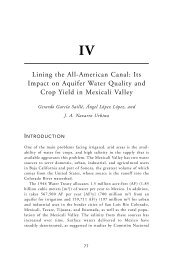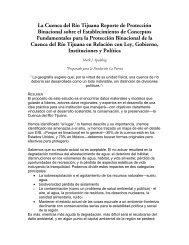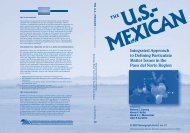Entire Book - Southwest Consortium for Environmental Research ...
Entire Book - Southwest Consortium for Environmental Research ...
Entire Book - Southwest Consortium for Environmental Research ...
Create successful ePaper yourself
Turn your PDF publications into a flip-book with our unique Google optimized e-Paper software.
Improving Transboundary Air Quality with<br />
Binational Emission Reduction Credit Trading<br />
10. Monitoring should be handled by private third parties and paid<br />
<strong>for</strong> by the parties to the trade. The use of third-party monitoring<br />
is common among existing emissions trading programs<br />
(Rosenzweig, et al. 2002). They are cost-effective, and because<br />
they require parties to the trade to pay, they also internalize the<br />
cost of monitoring, which helps ensure that only socially beneficial<br />
trades take place. An important additional factor <strong>for</strong><br />
transborder emissions trading is that the use of a private third<br />
party reduces infringements on sovereignty.<br />
11. Primary responsibility <strong>for</strong> certifying ERC trades should rest<br />
with the officials of the buyer’s home country. The asymmetry<br />
benefits that accrue from emissions trading to the seller are<br />
again at play. The seller’s jurisdiction benefits from reduced<br />
emissions, improved air quality, and from the financial gains of<br />
selling ERCs; there<strong>for</strong>e, the seller’s jurisdiction always has an<br />
incentive to certify a trade, even when environmental gains do<br />
not justify doing so. On the other hand, <strong>for</strong> a trade to benefit<br />
the citizens of the purchaser’s jurisdiction, transportation of<br />
the pollutant must be sufficient such that emissions are<br />
reduced in the neighborhood of the purchaser. When this condition<br />
is not met, officials of the buyer’s jurisdiction should<br />
not approve the use of the ERC as an offset. Thus, the officials<br />
of the seller’s and buyer’s jurisdictions face different incentives—the<br />
seller’s to always approve and the buyer’s to approve<br />
only if the ERC generates environmental benefits near the<br />
buyer. Because only mutually beneficial trades should be<br />
approved, only the buyer’s jurisdiction has the correct incentive.<br />
12. En<strong>for</strong>cement should be the primary responsibility of the purchaser’s<br />
jurisdiction. Even if no true emission reduction occurs,<br />
the seller’s jurisdiction benefits from the revenue generated<br />
from the sale of the ERC. Thus, the incentive to en<strong>for</strong>ce emission<br />
reduction is attenuated <strong>for</strong> officials of the seller’s jurisdiction.<br />
The buyer’s jurisdiction only benefits if emission<br />
reduction actually occurs. This provides an incentive to officials<br />
of the buyer’s jurisdiction to en<strong>for</strong>ce emission reductions<br />
strictly.<br />
124









